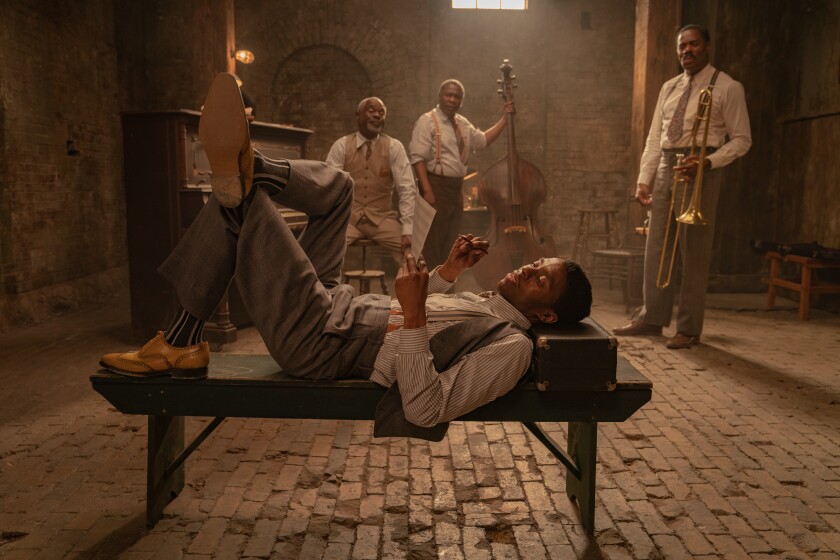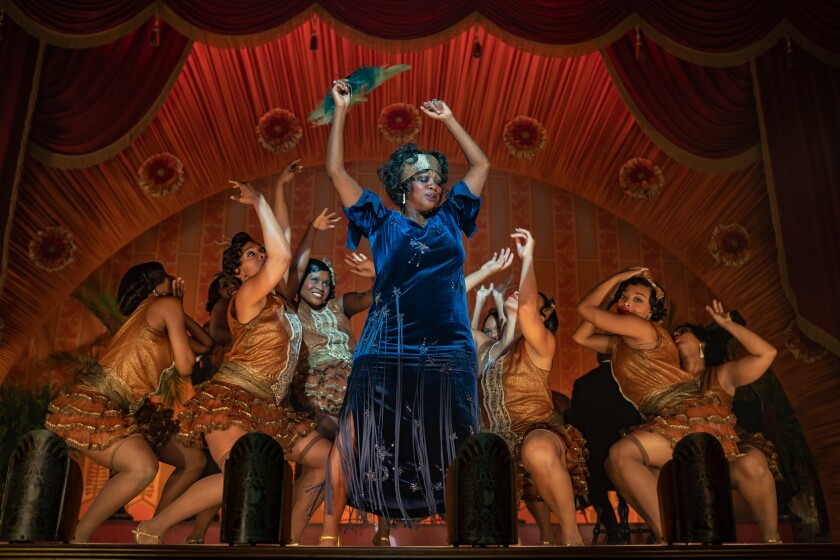Review: In ‘Ma Rainey’s Black Bottom,’ Chadwick Boseman gives his final and finest performance

(David Lee / Netflix)
By JUSTIN CHANG
Where to begin? It seems an appropriate question to ask of “Ma Rainey’s Black Bottom,” the gale-force whirlwind of a film adapted from August Wilson’s 1982 play. Sweepingly directed by George C. Wolfe and incisively adapted by Ruben Santiago-Hudson, it’s a story of Black lives and Black music in the early 20th century that has lost little of its significance in the 21st. And like most stage and screen productions of Wilson’s work, it’s a feast of inspired talk that leaves an audience, in turn, with no shortage of things to talk about.
There is, for one, the undimmed resonance of Wilson’s insights into the challenges and contradictions of African American identity. There are the joys, frustrations and inevitable compromises of making art, especially if you happen to be a musician of color in a white man’s recording studio, fighting to assert every inch of your domain (or to forge one to begin with). Most of all, there is the late Chadwick Boseman, giving a furiously inventive screen performance that also happens to be his last. It’s one spellbinding final reminder of what we’ve lost, and of how easily God, to invoke one of Wilson’s unseen major characters, can giveth and taketh away.
So again — where to begin? I’m still not sure, but then I’m not in bad company. After all, one of the story’s key conflicts finds several characters butting heads over the opening notes of a song, the very one that gives this play its title. Gertrude “Ma” Rainey (a spectacular Viola Davis), the pioneering Southern singer hailed far and wide as “the Mother of the Blues,” wants to stick with her usual arrangement, complete with an old-timey introduction that she expects her hapless nephew, Sylvester (Dusan Brown), to deliver. But her ambitious trumpet player, Levee (Boseman), wants to dispense with that “old jug-band music” and tap into a newer, jazzier sound, one far removed from the traveling tent shows where Ma Rainey’s career began.
The movie opens with one of those tent shows in Georgia, where Ma Rainey makes her first dazzling entrance, her face smeared with dark makeup and her skin glowing with sweat, as it will be throughout this feverishly overheated entertainment. Seductively swaying her hips and flashing a mouth full of gold teeth, she croons, “I’m on my way” — and indeed she is, propelled northward alongside countless other Black women and men seeking better opportunities. But Ma is bound for grander things than factory work; by the time her first number ends, she’s on a professional stage in a big city, basking in the glow of the audience’s adoration and her own hard-won stardom.
Davis is little short of stunning in the kind of brassy, feather-waving, no-prisoners-taking diva showcase she’s rarely attempted. (It’s a decidedly far cry from her Oscar-winning turn in the last major Wilson adaptation, “Fences.”) Resplendent in bold, spangly gowns and sheathed in form-padding rubber, her Ma Rainey is both a stellar performer and a mesmerizing object of contemplation. (Apart from one song, Davis’ smoky vocals were supplied by the singer Maxayn Lewis.) But “Ma Rainey’s Black Bottom” doesn’t linger on this potent spectacle. It’s much more fascinated by who Ma is — and also who her accompanists are — behind the scenes, and beyond the glare of the spotlight.

(David Lee / Netflix)
That fascination has led Wolfe and Santiago-Hudson not outward, in the manner of so many stage-to-screen adapters keen to “open up” their material, but inward. Reuniting for the first time since “Lackawanna Blues,” their 2005 HBO film of Santiago-Hudson’s play, they have taken Wilson’s great work and ruthlessly pared it down to essentials. There are workmanlike patches, but remarkably few dull ones. Every formal choice, from the exquisitely caressed lighting of Tobias A. Schlieeser’s images to the unifying orchestrations of Branford Marsalis’ score, ultimately feels in service of a story that barrels ahead with terrific urgency. At just over 90 minutes, this “Ma Rainey’s Black Bottom” feels not just adapted but accelerated, as if it were racing to meet the deadline its own characters keep putting off.
The story unfolds over a sweltering hot day in 1927 Chicago, briefly evoked with outdoor sets that have a glorious studio-backlot artifice. Ma Rainey is running predictably late for her recording session and winds up ceding much of the narrative spotlight to her band, which includes Ma’s guitar and trombone player, Cutler (Colman Domingo); her pianist, Toledo (Glynn Turman); and her bass player, Slow Drag (Michael Potts). They’re all consummate professionals who want the same thing as Ma’s frazzled agent, Irvin (Jeremy Shamos): to rehearse the songs, cut a good record and get in and out as quickly as possible.
They are thwarted on all fronts by Levee, who shows up well before Ma but turns out to be her near-equal in stubbornness and ego. Waltzing into the studio’s dingy rehearsal space with a shiny new pair of shoes and a pocket full of original songs he’s writing, Levee dreams big and talks even bigger: He’s impassioned, impudent and proudly insubordinate. Fancying himself a brilliant artist in a sea of dutiful drones, he hurls himself into the session determined to outsmart and upstage everyone — his bandmates, Ma Rainey and the systems of power that have kept him and other Black people in psychological shackles.
Levee is lean and agile — his pinstripe suit seems to hang off him as he dances and whirls — but he’s also larger than life. And Boseman, crossing into that zone where acting becomes an act of possession, unleashes the kind of intensely physical grab-you-by-the-lapels performance that the screen can hardly contain. Boseman could be the most self-effacing of movie stars, as no less a blockbuster than “Black Panther” demonstrated. But music — a defining passion of James Brown, his greatest role before this one — clearly had a way of unlocking his demonic inner showman.
You can see Levee’s insatiable lust for life in the proud jut of Boseman’s chin and the corners of his toothy grin. But you don’t see it nearly as vividly as you hear it. Levee speaks a language of pride and provocation; he’s all verbal jabs, blustery anecdotes and, eventually, furious recriminations as his exasperated bandmates repeatedly back him into a rhetorical corner. What emerges in all this back-and-forth is more than just a banal dispute over whose musical style is more au courant. We’re made to contemplate what it means to be a Black artist in a profoundly racist industry, and also what kind of moral justice a Black person can reasonably expect from “a white man’s God,” as Levee demands in one of two searing monologues.
Do you pray to that God, or curse him? Do you fight back or buckle under? As Levee notes, he’s been negotiating these questions all his life. So, for that matter, has Ma Rainey, though unlike Levee, she also has an established star persona and a keen sense of self-preservation. As we can see from her literally traffic-stopping appearance at the studio, Ma isn’t afraid to flaunt or flex. But she also understands that her power is still ruthlessly circumscribed in a white man’s world. And she knows exactly how far she can push the limits of Irvin’s patience, whether she’s insisting on keeping Sylvester on the payroll or demanding a bottle of Coke before the session can continue.
For all their differences, Ma Rainey and Levee are kindred spirits as well as nemeses. (Their rivalry takes on a carnal dimension when Levee pursues a midday fling with Ma Rainey’s younger girlfriend, Dussie Mae, played by Taylour Paige.) They are both visionaries and sellouts, serving up their considerable gifts to be duly exploited, and playing a ruthless game in which the rules will always be stacked against them. The other musicians, meanwhile, are simply trying not to lose. One of Wilson’s cruelest insights is that his characters, trapped together in close quarters, will turn on each other with an almost cannibalistic fury, channeling their justifiable rage in the wrong direction.
And it’s a measure of this movie’s discipline that the other actors, rather than being crowded out of the frame or overpowered by Boseman or Davis, register as vividly as they do. Domingo’s Cutler, bent on maintaining order and ensuring that no one supersedes Ma’s will, goes head-to-head with Levee and acquits himself admirably. Turman, reprising a role he played at the Mark Taper Forum in 2016, nails the gorgeous wistfulness of Toledo’s lament for an African diaspora in tatters: Likening all of history to a richly flavored stew, he sadly concludes that “the colored man is the leftovers.”
Levee sets out to refute that cruel fate, only to rush headlong into another. And Boseman, evincing the same integrity he clung to his entire career, refuses to soft-pedal the destination. He imparts to this seething, shattered man the gift of a broken soul, riven by anger and trauma, and makes him all the more human for it. His final moments of screen time are among his darkest, and also his finest.
‘Ma Rainey’s Black Bottom’
Rating: R, for language, some sexual content and brief violence
Running time: 1 hour, 34 minutes
Playing: Starts Nov. 25 in limited release where theaters are open; available Dec. 18 on Netflix
